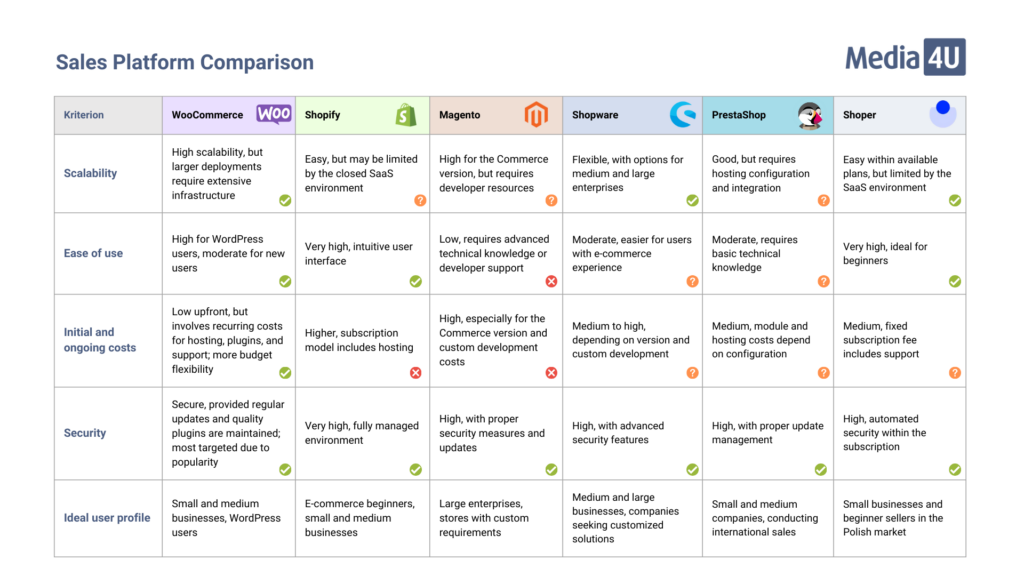

Do you want to set up an online store but need to know which e-commerce software is best for you? Choosing the right sales platform is the foundation of your online business’s success. Many solutions are available on the market, each promising to revolutionize how you run your online store. However, how can you make an informed choice in the thicket of marketing promises and technical specifications? In this article, we will review the most popular platforms for creating online stores – WooCommerce, Shopify, Magento, PrestaShop and Shoper – to help you understand their key differences and potential benefits for your business.
The most popular E-commerce platform
WooCommerce is one of the most popular platforms and is ideal for starting an online business. It supports about 15% of all existing online stores (source: BuiltWith). One of the key benefits of using WooCommerce is its deep integration with WordPress – the world’s most popular content management system. This integration allows users to effortlessly manage both the site’s content and the store’s functionalities from a single location. Additionally, a rich offering of plugins developed by the creators of WooCommerce and independent developers allows for precise customization of the platform to meet individual business and visual needs.
WooCommerce user profile:
Entrepreneurs seek a flexible, scalable solution that will grow with their business. This is particularly attractive for those with WordPress experience and wish to transform It into an online store. This platform allows for complete control over the store’s appearance and functionalities. Thanks to WooCommerce, creating a personalized online store that fully reflects the brand’s values and aesthetics is both simple and cost-effective.
Competitive shopping platforms
Alongside WooCommerce, in the world of e-commerce, other platforms also enjoy great popularity and trust among entrepreneurs. Shopify, Magento, and Shopware are three of the most competitive options on the market. Below is a brief presentation of each of these online selling platforms.
Shopify is a platform known for its ease of use and quick start, making it an ideal choice for entrepreneurs who want to quickly launch an online store without delving too much into technical details. Shopify offers a wide range of templates to create ready-to-go stores. Numerous apps allow for easy customization with active development of the e-commerce platform. The subscription model also provides hosting, which means less worry for the store owner.
Magento, now known as Adobe Commerce, is dedicated to more extensive solutions seeking advanced customization and scalability. As an open-source platform, Magento offers almost unlimited possibilities for system customization to meet customer expectations. However, e-commerce technical support then becomes inevitable. This extensive platform is, therefore, best for companies with a larger IT development budget and those that need complex, specific e-commerce solutions.
Shopware, a German online store software, is rapidly gaining global recognition. It offers entrepreneurs a unique combination of flexibility and intuitive usability. Shopware’s e-commerce software is particularly valued for its open architecture, which allows for deep customization and integration, making it an ideal solution for medium-sized and large enterprises that want to create a store precisely tailored to their needs. With a strong focus on delivering high-quality shopping experiences and unique customer journeys, Shopware is a perfect fit for brands looking to stand out by offering unforgettable shopping experiences and increasing sales. With Shopware, entrepreneurs can easily scale their operations while maintaining consistency and personalization at every step of the customer journey.
Discover development opportunities with Shopware <- Click here
Comparison of Functionality
Scalability: WooCommerce offers a high level of scalability, but for more advanced implementations (e.g., stores with a budget of 100–150 thousand PLN), it requires a well-developed infrastructure, paid plugins, their customization, and often custom coding. Shopify and Shoper provide easy scalability within available plans, but the limitation lies in their closed SaaS environments—users are dependent on the platform’s built-in features, and custom solutions are usually limited to basic JavaScript and CSS modifications. Magento and Shopware are best suited for large enterprises, while PrestaShop and WooCommerce offer greater freedom in terms of expansion and customization, making them more flexible for growing needs.
Ease of use: WooCommerce is intuitive for WordPress users. Shopify and Shoper are the easiest to use, making them ideal for beginners. Magento and Shopware require more technical knowledge, while PrestaShop offers more flexibility but demands manual configuration.
Costs: WooCommerce has relatively low initial costs, but it operates on a recurring payment model—you pay separately for hosting, selected plugins (usually annually), and optional technical support. In Shopify, Shopware, and Shoper, these elements are included in one fixed subscription, which offers convenience but limits flexibility. WooCommerce provides more freedom—if you have the technical know-how, you can minimize costs by investing only in hosting and essential plugins. PrestaShop, being an open-source platform, also allows flexible budget management, although costs can increase with paid modules and server maintenance. Magento offers the most comprehensive features, but due to complex implementations and higher developer rates, it is usually the most expensive solution among the platforms.
Security: WooCommerce offers solid security but requires a proactive approach—regular updates, careful plugin selection, and proper configuration. As the most popular e-commerce platform globally, it is also the most targeted for attacks and vulnerabilities, which leads some entrepreneurs to perceive it as less secure. In reality, frequent updates and an active developer community help WooCommerce quickly address threats—provided that the store is properly maintained. Shopify, Shopware, and Shoper provide closed, well-secured SaaS environments where security is automated. PrestaShop, like WooCommerce, requires manual updates and monitoring, while Magento delivers a high level of protection but only with professional management and continuous technical oversight.

How, then, should you choose the best sales platform?
Selecting the best e-commerce platform when you want to open your first online store may seem challenging, but the key is a good understanding of your own business needs and the potential that different solutions can offer you. When choosing an online store engine, it is important to consider several key criteria.
Understanding your business’s needs is a crucial step before making any decision. Is ease of use, scalability, customization, or security the priority for your business? Also, consider your sales goals and platform development strategies (e.g., potential online store positioning, SEO optimization, or internet marketing). This thorough understanding of your business needs will reassure you about the decision you make.
Evaluating potential: Each e-commerce platform has unique features and functionalities. WooCommerce is an excellent choice for those who value flexibility and integration with WordPress, as well as easy store creation. Shopify stands out for its ease of use and quick start. Magento is best for large enterprises requiring advanced functionalities, while Shopware offers a modern approach to content management and customization.
Selection criteria: When choosing an e-commerce platform, it is important to consider initial and ongoing costs, the ability to integrate the store with other tools and services, and access to support and educational resources. Don’t forget to also evaluate the opinions and experiences of other users.
Summary
The choice of an e-commerce platform should be preceded by a thorough analysis of your own needs and capabilities. Remember, the key to success is technology, the quality of products offered, and the shopping experience you provide to your customers.
We invite you to continue exploring the world of e-commerce and finding solutions that are ideally suited to your business. If you have any questions or need advice, contact us—we are eager to help you choose the best platform for your business.


